Taking a protein shake immediately after HIIT is a common practice by many people aspiring to build a leaner and more defined physique. But is it essential? What happens if you don’t? This is what I’ll be addressing in this post!
Generally speaking, having a protein shake after HIIT is highly recommended for people looking to build lean muscle. However, it is not essential that a protein shake is consumed immediately after HIIT. The most important thing is to consume enough daily protein overall.
2 years ago, I was the typical “Gym Bro” who NEEDED that post-workout protein hit, otherwise my whole day was ruined (obviously I was a complete drama queen).
This post shares my research and experience into why it’s not all too important to have that post-workout shake after all.
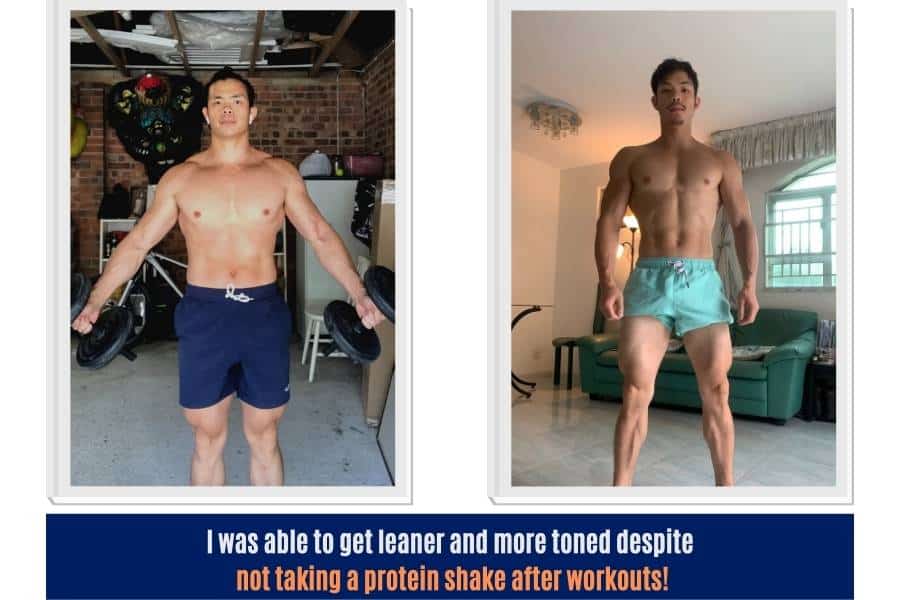
Why It Can Be Good To Have Protein Shake After HIIT?
Amino replenishment is the primary reason why it is good to consume a protein shake after HIIT. Muscle is broken down during intense exercises, such as HIIT, and amino acids from dietary protein facilitate the repair process. Without protein, post-workout muscle growth will be negatively impacted.
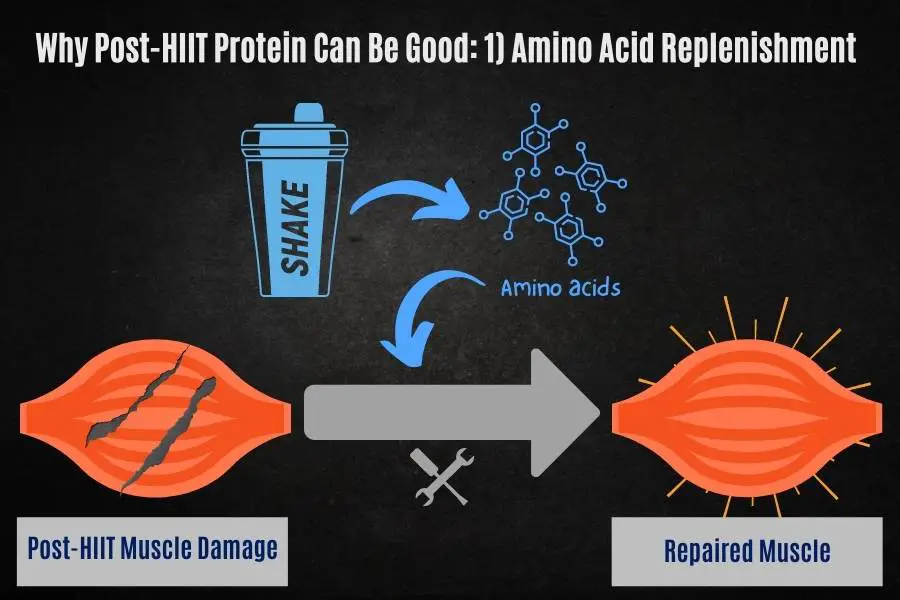
Now you may be wondering how muscle, protein, and amino acids relate to each other.
Simply put- muscle is made from protein which is made from amino acids.
And it just turns out that protein shakes are rich in amino acids.
So if you’re doing HIIT with the intention to build lean muscle, tone, or generally get ripped, then it’s a very good idea to down a protein shake immediately after a HIIT session.
This gives your muscles the building blocks it needs to repair the muscle fibers that were damaged after HIIT.
Whether you take your shake immediately after a workout or 1-2 hours after doesn’t matter.
What matters is you eat enough daily protein overall (but ideally you should have a high protein meal within 2 hours after a workout).
Additionally, your choice of protein doesn’t actually matter.
It could be from a steak, chicken breast, tofu, whatever.
But shakes are just the most convenient way for most people to ingest a cheap, quick, and potent hit of post-workout protein (who even has the time or money for a post-workout steak?!).
If you’re interested, you can check out my other article to learn to find out how HIIT can help you lose fat, gain muscle, and get ripped!
There’s Also A Second Reason…
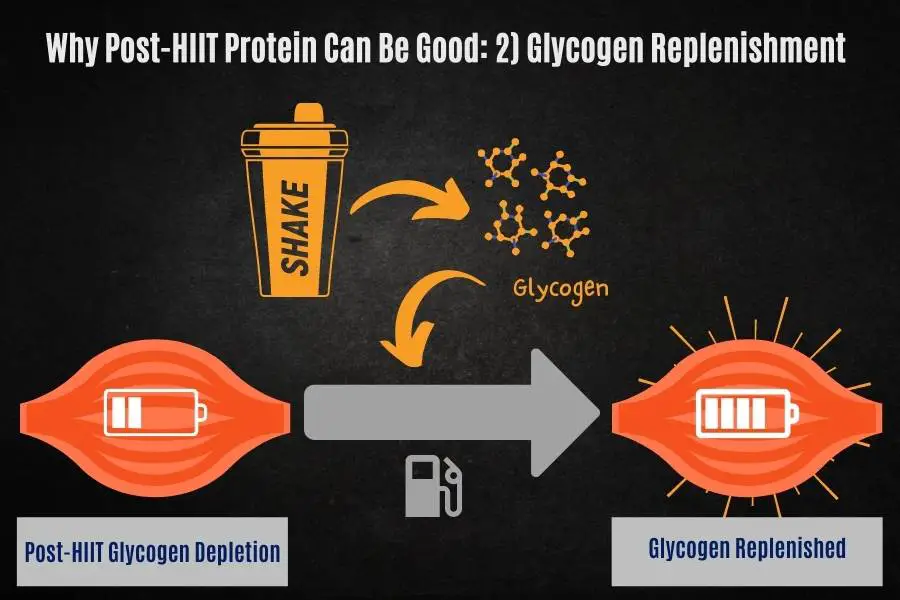
Glycogen replenishment is the other (slightly less important) reason why it’s a good idea to consume a protein shake after HIIT.
Glycogen is basically a large molecule comprised of a long chain of sugars.
This molecule is stored in your muscles at rest, where it serves as a source of backup energy that can be tapped into during intense exercises like HIIT.
Consequently, a vigorous HIIT session will usually deplete your glycogen stores.
And the body needs to replenish its glycogen store for optimum muscle recovery and to keep your muscles in tip-top working condition.
Now, glycogen replenishment mainly requires 2 things:
- Carbohydrates.
- Calories.
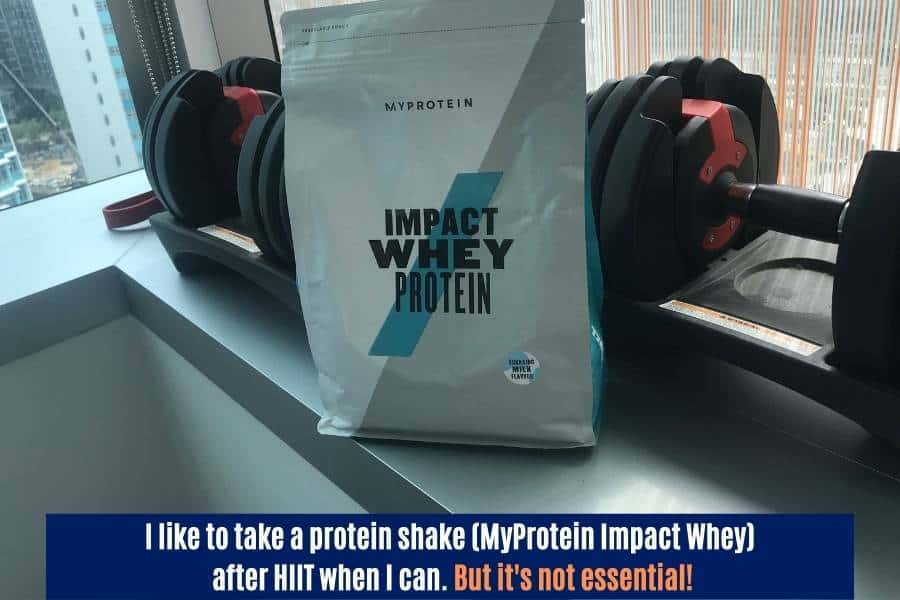
Some shakes like the Optimum Nutrition Serious Mass contain a lot of calories and carbohydrates in the form of sugars, and these contribute to glycogen replenishment.
Other shakes like the MyProtein Impact Whey are much leaner and contain very few calories and carbs.
But even these lean shakes still contain calories (typically around 100 cal per shake).
So even low-carb shakes can still facilitate the glycogen replenishment process by contributing their calories.
Ultimately:
A protein shake (regardless of whether it’s high- or low-carb) is good for keeping your metabolism burning, replenishing glycogen, and facilitating muscle recovery after HIIT if you don’t have time to eat a full-blown meal.
Choosing between having a shake or meal after HIIT is entirely up to you.
The important thing is to have a good protein hit within 2 hours after a workout.
What Happens If You Don’t Have A Protein Shake After HIIT?
The average person will not notice a difference if they do not consume a protein shake immediately after HIIT, as long as overall daily protein targets are met. The body can rely on calories, protein, and carbohydrates in the blood to fuel muscle recovery.
Numerous studies have shown that protein timing (i.e. the idea that you NEED to consume x amount of protein after a workout) is not as important as meeting your overall daily protein target for optimal muscle performance.
To cut a long story short:
Whilst downing that protein shake after HIIT can be a good idea, it’s not going to ruin your fitness gains if you don’t either.
The most important thing to worry about is making sure you reach your overall daily protein target and ideally have consumed a high-protein meal/shake within 2 hours of finishing HIIT.
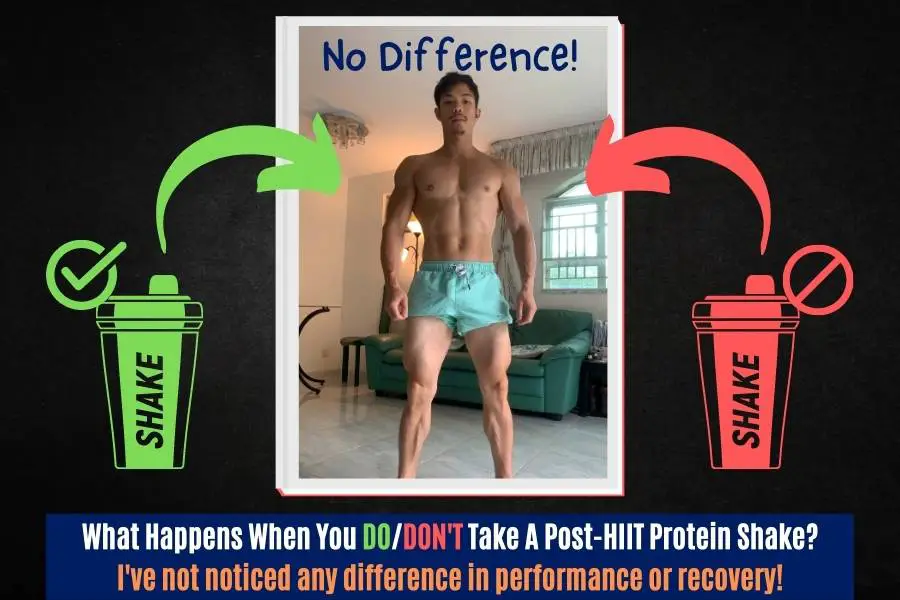
I’ve been through the wannabe Fitness Freak phase myself, where I felt it absolutely necessary to have a protein shake IMMEDIATELY after every workout.
That was 2 years ago.
Since then I’ve stopped caring so much about when I consume my protein.
Now I just worry about eating enough protein throughout the day (not the timing).
And you know what?
I’ve seen absolutely no difference in terms of my performance in HIIT or strength training alike.
I would highly recommend you eat a meal within 2 hours post-HIIT though (ideally with lots of protein). It could be a shake, sandwich, banana, whatever.
This will keep you going and prevent your metabolism from slowing down.
If you’re new to HIIT, you may also be interested in my other article which reveals 11 signs that you’re doing HIIT right!
How Much Protein Should You Eat After HIIT?
Generally speaking, a person should eat 20-25 grams of protein within 2 hours after a HIIT workout. This will facilitate the muscle repair and recovery process. The body can only absorb approximately 25g of protein per meal, so it is not recommended to consume any more than this.
Yup, you read right.
Just like you can only eat so much food in one meal, your body can only absorb so much protein in one go.
This has been shown in this 2018 study.
“Any protein intake greater than 20-25g per meal is beleived to be oxidized into Urea (urine)”
Schoenfeld et Al. 2018.
Here, the authors concluded that to be extra safe, you should aim to eat around 30 grams of protein (max) per meal.
And you should also aim to get at least 4 meals per day for optimum lean muscle gains.
But it’s worth noting that this study was based on weight lifters who were trying to maximize muscle mass.
If you’re doing HIIT with the intention of burning some belly fat and building some lean muscle along the way, there’s nothing wrong with sticking to 20-25 grams of protein per meal (that’s the equivalent of the average protein shake).
Consuming any protein amounts more than this is likely to end up in the toilet (i.e. in your pee).
My tried and tested method for losing fat and building muscle at the same time is through weighted HIIT workouts. You can find out the benefits of doing HIIT with weights in my other article here!
What Foods Should You Eat After HIIT?
Recommended foods to consume after a HIIT workout include; protein shakes, nuts, fresh fish and meat, soy products, whole grains, and fresh fruit. Combined, these foods are high in protein, simple carbs, and complex carbs. These macronutrients will facilitate muscle recovery and repair.
Here’s why each macronutrient is important for a post-HIIT meal:
- Protein fuels muscle repair. As you now know, consuming protein after your HIIT workout is good for providing your muscles with the amino acids they need to repair themselves.
- Carbohydrates fuel muscle recovery. As you now also know, consuming carbohydrates after a HIIT workout is good for glycogen replenishment and muscle recovery. Ideally, you should consume a fast-digesting simple sugar source (like a banana) immediately after a workout, and slow-digesting complex carb source (like wholegrains) within 2 hours of finishing a workout.
- Fibre slows down digestion. Fresh fruit and veg contain fiber which slows your digestion. As a result, protein and carbs move through your gut more slowly and are therefore also absorbed more slowly. This is perfect for feeding your muscles a slow and steady supply of energy for repair.
Other Things You Should Do After Doing HIIT
After a HIIT workout, the most important things to do are; do a cooldown, stretch, eat, rehydrate, and rest. Doing this will facilitate the muscle repair and recovery process, whilst also reducing the risk of injury. Taking a cold shower can also help recovery, but this is not essential.
Here’s why each recommendation is important after HIIT:
- Cool down. Perform light movements after hiit (like jogging on the spot) to let your heart rate, breathing, and body temperature return to resting levels slowly. This is less stressful for your muscles and promotes better recovery.
- Stretch. Dynamic and static stretches dissipate lactic acid build-up to promote faster recovery. Post-workout stretching has also been shown to facilitate strength gains by “loosening” the muscles for your next workout.
- Hydrate. Water is a component of muscle tissue and is essential for optimal muscle performance. Drink, drink, drink!
- Rest. Avoid strenuous activity after HIIT. This will give your muscles the optimum environment for recovery.
- Cold shower. I found this can help reduce muscle soreness. But it’s not for everyone!
Conclusion
I’ve explained why it can be good to have a protein shake after HIIT.
Whilst the benefits of a post-HIIT protein shake are undeniable for muscle repair and recovery, most people will not notice any difference in performance or recovery by not having a shake immediately after HIIT.
Ideally, you should have a high-protein meal within 2 hours after a workout (whether it be from a shake or a proper meal doesn’t matter), especially if you’re training to develop a leaner and more athletic-looking physique.
But what is even more important is to make sure you reach your total daily protein intake target.
Do you take a protein shake after HIIT?
Feel free to send me a message if you have any questions! You can find my details on the “contact us” page.
You may also be interested in the downloadable Kalibre Blueprint PDF which details exactly how I gained 40lbs of lean muscle (it’s 100% free!). It details the exact exercises and nutrition (with printable worksheets) I used to go from skinny to ripped!
Thanks for reading guys!
Peace Out,
Kal
(Biochemistry BSc, Biomedical Sciences MSc, Ex-Skinny Guy)


